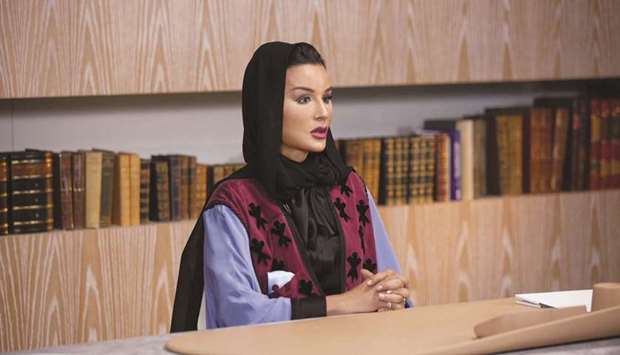Her Highness Sheikha Moza bint Nasser, Chairperson of Qatar Foundation for Education, Science and Community Development (QF), urged the international community to unite in asking the United Nations (UN) Security Council to take action and bring to justice those who commit atrocities against education – and what it represents.
“Those who attack education are criminals who steal far more than reading, writing, and arithmetic. Such criminals should be held accountable,” Her Highness Sheikha Moza said at a panel discussion marking the ‘Second International Day to Protect Education from Attack’, held virtually on Thursday.
Titled “Protecting Education and Building Sustainable Peace”, the talk was organised by Education Above All (EAA) Foundation in partnership with Unicef, Unesco, and the Office of the Special Representative of the Secretary-General for Children and Armed Conflict. It was moderated by The New York Times columnist Nicholas Kristof.
Her Highness Sheikha Moza, who is also the Chairperson of Education Above All Foundation, and a UN Sustainable Development Goals advocate, believes the international community should ensure that those responsible – with strong evidence behind the attacks – must be brought into account “to face the consequences and pay for the damages they have done.”
Her Highness Sheikha Moza highlighted the importance of holding the event saying it aims “to draw attention to the magnitude of an issue and to provide a rallying point because there are millions of children who no longer have schools as a result of conflicts.”
Her Highness Sheikha Moza stressed that despite the global health crisis and the UN secretary general’s call for global ceasefire, the number of attacks to education has increased by a third in 2020.
“One year alone, there were nearly 2,400 attacks on students and staff,” Her Highness Sheikha Moza said, noting that these victims were not collateral damage but were deliberately targeted and “attacked in cold blood in the various places where they should be safe and play.”
“Let me repeat, deliberately targeted, and why? Because schools are places where new generations start their language, learn their history, culture and traditions, develop a sense of identity and confidence,” stressed Her Highness Sheikha Moza, underscoring the importance of the annual event.
Protecting education has been on the forefront of the international agenda since the International Day to Protect Education from Attack was established in 2020 as per UN General Assembly Resolution A/74/275.
The second edition of the event witnessed the participation of UN secretary-general António Guterres, Mohamed Bazoum, President of the Republic of Niger; Audrey Azoulay, director general of Unesco; Henrietta Fore, executive director of Unicef; HE Sheikh Mohammed bin Abdulrahman bin Jassim al-Thani, Qatar’s Deputy Prime Minister and Minister of Foreign Affairs; Karim Khan, chief prosecutor, International Criminal Court; Peter Maurer, president of the International Committee of the Red Cross; and Josep Borrell, High-Representative of the European Union for Foreign Affairs and Security Policy; among other speakers.
“Those who attack education are criminals who steal far more than reading, writing, and arithmetic. Such criminals should be held accountable,” Her Highness Sheikha Moza said at a panel discussion marking the ‘Second International Day to Protect Education from Attack’, held virtually on Thursday.
Titled “Protecting Education and Building Sustainable Peace”, the talk was organised by Education Above All (EAA) Foundation in partnership with Unicef, Unesco, and the Office of the Special Representative of the Secretary-General for Children and Armed Conflict. It was moderated by The New York Times columnist Nicholas Kristof.
Her Highness Sheikha Moza, who is also the Chairperson of Education Above All Foundation, and a UN Sustainable Development Goals advocate, believes the international community should ensure that those responsible – with strong evidence behind the attacks – must be brought into account “to face the consequences and pay for the damages they have done.”
Her Highness Sheikha Moza highlighted the importance of holding the event saying it aims “to draw attention to the magnitude of an issue and to provide a rallying point because there are millions of children who no longer have schools as a result of conflicts.”
Her Highness Sheikha Moza stressed that despite the global health crisis and the UN secretary general’s call for global ceasefire, the number of attacks to education has increased by a third in 2020.
“One year alone, there were nearly 2,400 attacks on students and staff,” Her Highness Sheikha Moza said, noting that these victims were not collateral damage but were deliberately targeted and “attacked in cold blood in the various places where they should be safe and play.”
“Let me repeat, deliberately targeted, and why? Because schools are places where new generations start their language, learn their history, culture and traditions, develop a sense of identity and confidence,” stressed Her Highness Sheikha Moza, underscoring the importance of the annual event.
Protecting education has been on the forefront of the international agenda since the International Day to Protect Education from Attack was established in 2020 as per UN General Assembly Resolution A/74/275.
The second edition of the event witnessed the participation of UN secretary-general António Guterres, Mohamed Bazoum, President of the Republic of Niger; Audrey Azoulay, director general of Unesco; Henrietta Fore, executive director of Unicef; HE Sheikh Mohammed bin Abdulrahman bin Jassim al-Thani, Qatar’s Deputy Prime Minister and Minister of Foreign Affairs; Karim Khan, chief prosecutor, International Criminal Court; Peter Maurer, president of the International Committee of the Red Cross; and Josep Borrell, High-Representative of the European Union for Foreign Affairs and Security Policy; among other speakers.


